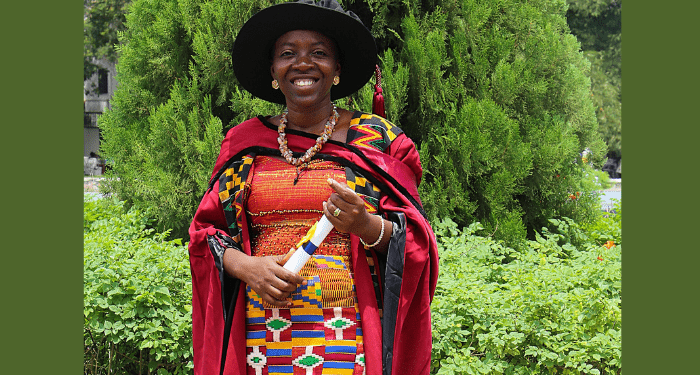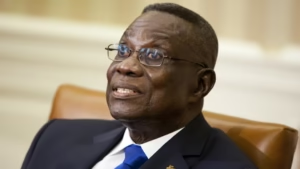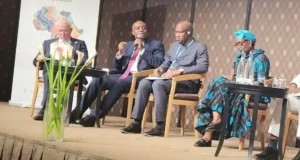In a historic achievement for the University of Ghana, Dr. Gloria Agyeiwaa Antwi Botchway has become the first woman to earn a PhD in Mathematics from the institution, breaking gender barriers and paving the way for future female mathematicians in a field traditionally dominated by men.
Dr. Botchway’s journey from Akaa Buem in the Oti Region to making history at the University of Ghana is a testament to her resilience and determination. Born as the second child in a family of four, she faced significant challenges as her family moved to Accra to support her mother’s education. Their new life in Accra was marked by hardship, as they lived with an aunt in a cramped compound, with the weight of financial struggles and instability looming large.
From a young age, Dr. Botchway displayed an entrepreneurial spirit, helping to support her family by hawking goods on the streets at just seven years old. “I remember selling pure water, yam, and fish. It was tough, but I loved anything related to business and accounting,” she recalled. Despite her mother’s concerns about the risks, Dr. Botchway embraced the experience, which shaped her early life.
School life was equally difficult. While her classmates enjoyed a variety of meals, Dr. Botchway often packed leftover banku to school, and she and her brother would hide behind the stairs to avoid the teasing. “We hid because we didn’t want anyone to see what we were eating,” she said, reflecting on the sacrifices she made for her family.
After several relocations across the country, including to Asamankese and Winneba, Dr. Botchway faced additional challenges in her education. She attended six different schools during her basic education, which meant constantly adapting to new teaching methods and curriculums. “It was tough, and I didn’t like science because each school taught different topics,” she shared.
Despite the adversity, Dr. Botchway remained steadfast in her pursuit of education. She completed her basic education wearing the same school uniform from class four through to junior high, as financial constraints made it impossible to buy new clothes. “Life has been difficult,” she admitted, yet her mother’s unwavering support allowed her to continue her education.
Dr. Botchway’s transition to secondary school at Accra Girls was the turning point in her academic journey. Initially focused on business subjects, she discovered her love for Mathematics, a subject that both challenged and inspired her. “I’ve always loved Maths. It challenged me, and I wanted to venture into a field where few others were going,” she said. Encouraged by her teacher, who urged her to pursue a career in academia, Dr. Botchway’s passion for the subject grew.
At the University of Ghana, she initially enrolled in Business Administration but soon shifted to Mathematics, inspired by professors like Prof. Elsie Kaufmann and Dr. Adu Gyamfi, who recognized the advantages of pursuing a degree in Mathematics. “I wanted a field where few people ventured,” she explained.
Throughout her academic journey, Dr. Botchway faced numerous obstacles, both academically and personally. One of the most significant challenges was the lack of female role models in her field. “People didn’t expect me to pursue Mathematics, and some were very discouraging,” she admitted. Yet, these challenges only fueled her determination to succeed.
Dr. Justine Johnson, a colleague of Dr. Botchway, described her as a dedicated and ambitious individual. He praised her leadership, particularly in establishing a Mathematics study group that helped many students, including himself, improve their skills. “Nothing is impossible for her; she always strives to solve problems,” Mr. Johnson said.
Balancing her studies with family life presented additional challenges. Dr. Botchway married during her master’s program and had two children before graduation, adding two more during her PhD. She credits her supportive husband and family for helping her juggle her roles. “My husband was always asking, ‘What have you done today?’ Even though he didn’t fully understand what I was doing, he kept me going,” she said.
Her mother, Mrs. Margaret Aduam, was a constant source of emotional and practical support, taking care of her children while Dr. Botchway studied. “It wasn’t easy, but we helped her so she could focus,” Mrs. Aduam said. The entire family, especially those in her hometown of Jasikan, are proud of her achievement, celebrating her success as a source of inspiration for the community.
In 2024, Dr. Botchway’s persistence paid off when she became the first woman to earn a PhD in Mathematics from the University of Ghana. This achievement is not only a personal milestone but also a major step forward for gender representation in STEM fields in Ghana.
Now that she holds her PhD, Dr. Botchway is focused on making a lasting impact in her field and inspiring the next generation of female mathematicians. She is actively involved in a project called “Enhancing M in STEM,” which seeks to improve Mathematics education for girls in secondary schools. “I want to see Math being applied to solve real-world problems, not just theoretical concepts,” she said.
Dr. Botchway also aspires to a professorship. “I aim to become the first female Professor of Mathematics at the University of Ghana,” she declared. Her advice to young women considering a career in Mathematics is simple: “Don’t let what people say stop you. Don’t let the environment stop you. Don’t let yourself stop yourself.”
Professor Deborah Atobrah, Director of the Centre for Gender Studies and Advocacy (CEGENSA) at the University of Ghana, highlighted the significance of Dr. Botchway’s achievement for women in STEM. “This is a huge achievement, and we are excited to see more women following in her footsteps,” she said. However, she also acknowledged the need for further support, including financial aid and guaranteed opportunities for female PhD holders in STEM.
Dr. Chisara Peace Ogbogbo, Head of the Department of Mathematics, praised Dr. Botchway’s work ethic and dedication. “She’s very serious-minded and reliable. I can always count on her,” she said. Dr. Ogbogbo also called on the government to provide more scholarships for female students in STEM and to take steps to encourage girls to pursue Mathematics.
Dr. Botchway’s story is one of perseverance, resilience, and breaking barriers. Her achievement is a testament to the power of education and the importance of support systems in overcoming obstacles. As Ghana works to increase female participation in STEM, Dr. Botchway’s journey serves as a beacon of hope and a call to action for greater gender equality in education and beyond.




